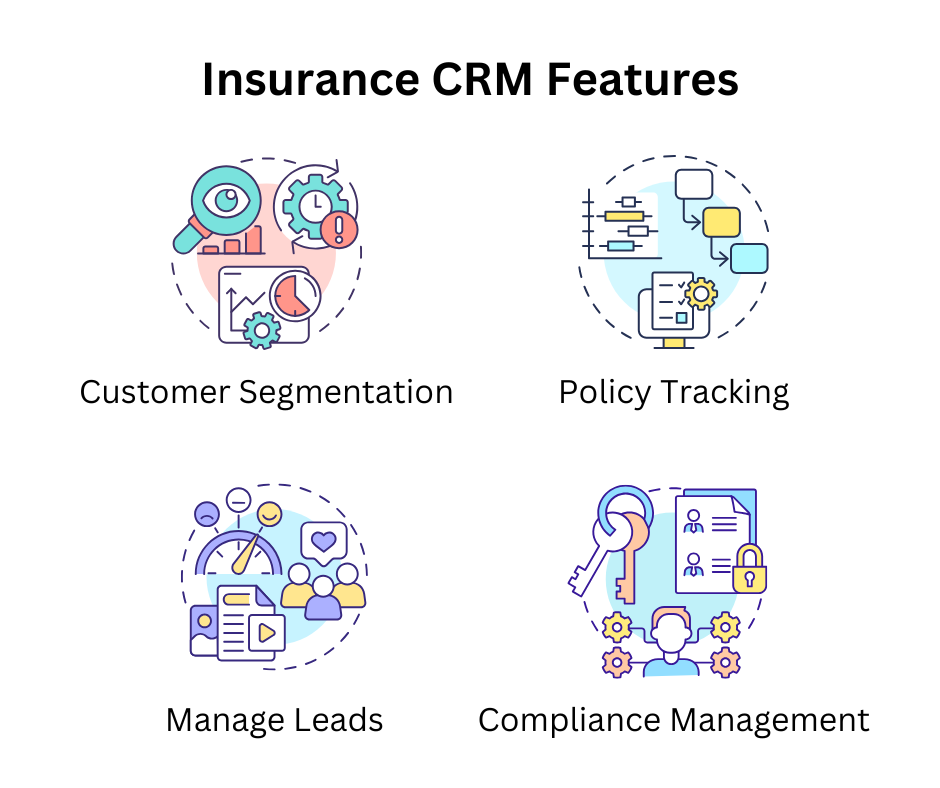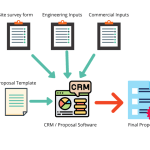Insurance agents often look for a CRM that's fine-tuned for the insurance sales process. So, are there any customized insurance CRM apps out there? Or is it better to build your own custom CRM for insurance selling? Can nocode and AI help in doing this? Let's explore.
Understanding the CRM Needs of Insurance Agents
Insurance agents juggle a lot — policies, follow-ups, renewals, and compliance. A CRM isn’t a luxury anymore — it’s a necessity.
Example: Agents dealing with NDIS (National Disability Insurance Scheme) clients need to track service providers, funding, and plan reviews. A CRM keeps all of this organized.
Here’s what a good CRM helps with:
- Client Information Management: Stores contact info, policies, claims, call logs, emails — all in one place.
- Interaction Tracking: Logs every call, email, chat, and meeting so agents can stay on top of client relationships.
- Task Automation: Sends automatic reminders for follow-ups, birthdays, and policy renewals.
- Marketing Automation: Sends personalized emails, newsletters, or SMS campaigns.
- Reporting & Analytics: Tracks sales, conversions, and customer satisfaction.
A CRM designed with insurance workflows in mind makes agents faster, smarter, and more customer-friendly.
Key Features to Look for in an Insurance CRM
Choosing the right CRM is all about matching it to your daily work. Look for these essential features:
- Lead Management: Organizes leads so you don’t lose track of potential clients.
- Policy Tracking: Monitors renewals, updates, and claims effectively.
- Automated Communication: Sends reminders and updates to clients automatically.
- Client Segmentation: Helps you personalize outreach based on client type.
- Mobile Accessibility: It helps agents on the go access CRM through mobile devices and serve clients anytime, anywhere.
- Compliance Management: Ensures you're on top of regulatory requirements and client data privacy.
These features create smoother operations and more personalized customer experiences.
Best CRM Software for Insurance Agents (with Pros, Cons & Pricing)
Here’s a quick comparison of the top CRMs used by insurance professionals
| CRM | Best For | Starting Price | Pros | Cons |
|---|---|---|---|---|
| Salesforce | Large Insurance Agencies | $25/user/month | Customizable, advanced tools, integrations | Complex setup, higher cost, training needed |
| Zoho CRM | Small-Mid Insurance Businesses | $14/user/month | Affordable, easy to use, mobile-friendly | Limited insurance features, plugin dependency |
| HubSpot CRM | Startups & New Agents | Free (Premium starts at $50/month) | Easy setup, strong lead tracking, free tier | Expensive upgrades, limited flexibility |
Salesforce
Salesforce is a heavyweight in the CRM world. Its robust features and scalability make it a favorite among insurance agencies.
Pros:
- Highly customizable
- Advanced automation and reporting
- Excellent integration ecosystem
Cons:
- Steep learning curve
- Expensive for small teams
- Requires training and technical setup
Pricing: Starts at $25/user/month; can increase with add-ons.
Zoho CRM
Zoho CRM is known for its affordability and ease of use. It's a great option for insurance agents looking for straightforward solutions.
Pros:
- Affordable
- Easy to use and mobile-friendly
- Good for small to mid-sized agencies
Cons:
- Lacks built-in insurance workflows
- Limited third-party support
- Inconsistent customer service
Pricing: Starts at $14/user/month
HubSpot
HubSpot CRM provides a freemium model, making it attractive for agents starting with CRM systems.
Pros:
- Free basic version
- Simple to set up
- Strong lead tracking and marketing automation
Cons:
- Paid features are expensive
- Less flexible for complex insurance needs
Pricing: Free plan; paid features start at $50/month
Each CRM has its strengths that cater to the different needs of insurance agents. Salesforce offers robust customization, Zoho provides great value, while HubSpot ensures easy startup.
Consider your specific requirements and budget to find the best fit.
Build Custom Insurance CRM with AI & Nocode
Insurance agents often have unique needs when it comes to managing client information and renewals. Off-the-shelf CRM solutions may offer a lot of features, but they might not fit perfectly with specific requirements. This is where a custom NoCode CRM with Fuzen comes into play.
With Fuzen, building a tailored CRM you can build a tailored CRM that matches your exact business processes without getting into the complexities of coding. Thanks to our nocode platform and Gen AI capabilities.
The advantages of using Fuzen to create your CRM include:
- Cost Savings: save up to 80% cost on software development.
- No Subscriptions: Avoid paying monthly or yearly for bloated tools you don’t need.
- Ease of Maintenance: Simple interface to update features anytime.
- Scalability: Grows with your agency’s needs using powerful backend editing tools.
Plus, Fuzen’s AI builder lets you:
- Add smart automations
- Use chat-based customization
- Get real-time insights
It’s like building your dream CRM with drag-and-drop and AI prompts — zero coding required.
Steps to Create Your Custom Insurance CRM with Fuzen
You can use a template or build your app with our AI app builder within minutes.
- Define Your Requirements: List must-have features: policy tracking, reminders, reports, etc.
- Customize with AI: Use simple prompts to add automation, filters, reports, and more.
- Deploy with 1 Click: Fuzen hosts everything — no server setup or tech hassles.
- Tweak & Test: Iterate until your CRM works just the way you need.
- Join the Community: Get help, ideas, and feedback from other builders.
Creating a customized CRM with Fuzen is not only doable but also a smart move to cater to niche insurance demands effectively.
Conclusion
A custom CRM built with Fuzen’s no-code tools is tailored to how you actually work. It eliminates bloated features, keeps costs low, and adapts as your agency grows.
By building your own CRM:
- You control your data and features
- You cut subscription costs
- You save time with smart automation
It’s a viable option to create an insurance CRM that enhances your business's efficiency and effectiveness at a fraction of the cost.
👉 Start Building with Fuzen – It’s Free!

Pushkar is a seasoned SaaS entrepreneur. A graduate from IIT Bombay, Pushkar has been building and scaling SaaS / micro SaaS ventures since early 2010s. When he witnesses the struggle of non technical micro SaaS entrepreneurs first hand, he decided to build Fuzen as a nocode solution to help these micro SaaS builders.



